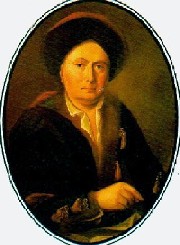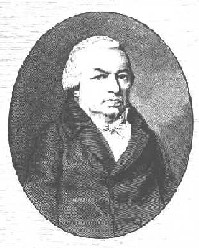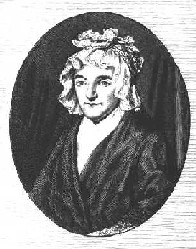 Grandfather Louis or Ludwig van Beethoven |
Grandfather Ludwig van Beethoven worked for the Electorate of Bonn for forty years: as baritone singer from 1733 until 1761, and in this function as well as that of a Kapellmeister until his December 25th, 1773, death (from a stroke). Soon after his arrival in Bonn, he married a local girl, Marie Poll. The couple had to mourn the loss of several children and were left with only one surviving son, Johann*, who was born either in late 1739 or in early 1740. The Fleming Ludwig van Beethoven, in addition to his position as a Court musician, also had a side line business of exporting Rhine and Moselle wine to his native Flanders.
His wife Marie, who might not have been able to deal easily with the loss of her infant children, took to the readily available bottles of wine. By the time that her son Johann had become a mediocre tenor singer at the Bonn court, her alcoholism had become so severe that she had to live in confinement in a cloister of nuns in Cologne. Ludwig van Beethoven senior and his young adult son Johann lived alone as bachelors.
 Presumably Johann van Beethoven |
"Johann der Läufer" or "Johann the runner", as the Kapellmeister nick-named his son*, loved to wander through the countryside around Bonn. During summer, when the Elector stayed at his Münster residence in Westphalia, some of the court musicians did not have to come along. Johann used his free time to wander as far as Koblenz or even to Ehrenbreitstein across the river Rhine.
(*More recent Beethoven research has brought forth the contention (by Canisius) that Ludwig van Beethoven senior might not have been the biological father of Johann. If that were the case, indeed, Marie Poll's later behavior and addiction might also have to be viewed in the light of that possibility.)
On one of his wanderings, Johann met a young widow in an Ehrenbreitstein tavern. Her name was Maria Magdalena Laym, nee Kewerich. Her father used to be chief cook at the Court of the Elector of Treves (Trier) who held court at Ehrenbreitstein. When she was sixteen years old, she married a valet of this Elector. The young couple had one child who died in infancy. Mr. Laym also died soon after.
Johann van Beethoven and Maria Magdalena Laym, nee Kewerich, were married in Bonn in 1767. Grandfather Ludwig van Beethoven initially did not approve of this marriage. He thought that a court musician should marry someone better than a servant's daughter. We know of this through the so-called "Fischer manuscript", a collection of memories the Fischer family, long-time landlords of both Ludwig van Beethoven senior and of Johann van Beethoven, later put together of the family of their most famous tenant. The two Beethoven bachelors lived right above the Fischer family, and the Fischers could thus overhear the conversation when Johann told his father of his marriage plans.
The young couple's brief marital bliss might have received its first blow when their first child, Ludwig Maria, born in the spring of 1769, died after only six days.
One could say that the fate of the Beethoven family in Bonn was shaped by few triumphs and may tragic events. Ludwig van Beethoven found professional success in his new residence, he was well-respected as a musician and as a man by Bonners of all walks of life: by his aristocratic employer, his fellow court musicians, and by the burghers of Bonn. In his private life, the "normal" course of marriages of his day, namely that of a couple's having several children of whom some did not survive, cast a shadow over his marriage and sent his wife into alcoholism.
While his son Johann was far less talented as a singer than he was and also had less self-respect, and while he may have received his position as a tenor singer at the Bonn court mainly due to his father's excellent reputation, Barry Cooper does point out that Johann van Beethoven was at least very active during the first years of his marriage, namely as tenor singer and as voice and piano teacher. Nevertheless, father Ludwig van Beethoven knew how to stand up for his rights and how to address his superiors with dignity, while Johann van Beethoven, in petitioning for his first permanent position at age 16, referred to "my insignificant self" in describing himself towards the Elector. This tendency to either wind his way through or to, on the other hand, becoming over-confident to the point of embarrassment would remain one of his traits throughout his entire life.
 Presumably Maria Magdalena van Beethoven |
The young widow Maria Magdalena, nineteen years old when she married Johann, was a serious young woman who had already suffered the loss of an infant and of her first husband. The loss of her second child in her second marriage did not help her cheerful disposition.
This was the family into which Ludwig van Beethoven would be born.